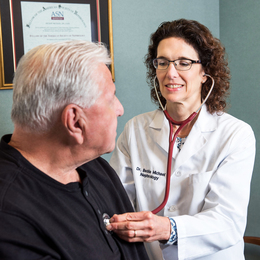
Sponsored Content: Expert Care with a Personal Touch
At Marlton Nephrology and Hypertension, Dr. Beckie Michael offers individualized treatment for kidney disease and high blood pressure.
Considering the busy schedules that most of us tackle on a daily basis, it can be easy to overlook an important health factor like blood pressure. But just because it cannot be seen or felt does not mean it should be ignored, and May is the perfect time to address it.
With National High Blood Pressure Education Month upon us, many health care professionals will be taking the opportunity to raise awareness about its profound impact on the population.
For example, high blood pressure (HBP) occurs in 40 percent of adults in the United States, and often does not cause symptoms. The prevalence of HBP increases with age, with 75 percent of those over 65 having HBP. Unfortunately, only 50 percent of Americans with HBP have their blood pressure under good control.
Good control of HBP is important because HBP increases the risk for heart disease and stroke (two of the leading causes of death in older Americans) as well as for atrial fibrillation, heart failure and kidney disease.
Dr. Beckie Michael, a board-certified physician in nephrology and hypertension specialist, has more than 25 years of experience in treating patients with kidney disease and high blood pressure. Her practice, Marlton Nephrology and Hypertension, offers state-of-the-art care with a personalized approach.
We recently sat down with Dr. Michael to learn more about high blood pressure and ways to treat this silent killer.
We recently sat down with Dr. Michael to learn more about high blood pressure and ways to treat this silent killer.
Q: What is hypertension?
Dr. Michael: Hypertension is high blood pressure (HBP). Normal blood pressure (BP) is less than 120/80 millimeters of mercury (mmHg). The top number is the systolic (SBP) and the bottom number is the diastolic (DBP) blood pressure. Both readings are important. Elevated BP is SBP of 120-129 mmHg. HBP is defined as SBP greater than or equal to 130 or DBP greater than or equal to 80. Every increase in SBP by 20 mmHg, or DBP by 10 mmHg, doubles the risk of death from stroke or heart disease. The goal BP for most patients is less than 130/80.
Q: What causes high blood pressure?
Dr. Michael: Most HBP is caused by genetic, environmental and other factors. Less commonly, other diseases can cause HBP, including kidney disease, kidney artery narrowing, tumors or overactivity of the adrenal glands, thyroid disease and sleep apnea. These conditions can be tested for when HBP is difficult to control. Certain medications can also elevate BP, including NSAIDs, oral contraceptives, decongestants, antidepressants and steroids.
Q: How is high blood pressure treated?
Dr. Michael: Lifestyle modification is very important in controlling HBP. When this is not effective, medications are necessary and specific choices are based on other medical problems and/or concern for side effects.
Q: Which lifestyle medications are most helpful?
Dr. Michael: Living a healthy lifestyle is very important in optimizing health outcomes, especially in regards to controlling HBP. A diet rich in fruits, vegetables and whole grains, and low in fat and sugar, can reduce BP with the added benefit of weight loss. For every 2-pound weight loss, SBP can decrease by 1 mmHg. Sodium intake (less than 2,000 milligrams per day) and exercising a minimum of 90 minutes weekly can each reduce SBP by 5 mmHg. Alcohol intake should be limited to two beverages daily for men and one for women.
Q: Why are there so many different medications used to treat high blood pressure?
Dr. Michael: There are several classes of medications used to treat HBP, and each works to reduce BP differently. Many patients will require three different HBP medications to control their blood pressure. The good news is that a single daily dose of two or three HBP medications in one pill is available and can improve compliance.
Q: How concerned should we be about the recall of several high blood pressure medications?
Dr. Michael: The recent voluntary recalls of mainly angiotensin receptor blockers is related to the finding of trace amounts of impurities identified as probable human carcinogens. The actual risk is quite low (less than one in 8,000 lifetime increased risk of cancer). Recalled medication is identified by manufacturer and lot number and will be replaced by the same or similar non-recalled product by the pharmacy. HBP medication should not be discontinued without speaking to your prescriber.
Q: Should patients measure their blood pressure outside of the doctor’s office?
Dr. Michael: Yes. Self-monitoring of BP has been shown to improve compliance with medications and HBP control. The BP cuff must be the right size. Measurement should occur after resting in a chair with feet on the floor and back supported for more than five minutes. If there is a difference in BP measurements between the arms, the higher arm should be used. Some health insurance companies cover the cost of a BP monitor.
Marlton Nephrology and Hypertension
769 Route 70 E., Suite C-125, Marlton
856-988-8800 | MarltonKidneyDisease.com
To read the digital edition of South Jersey Magazine, click here.
Published (and copyrighted) in South Jersey Magazine, Volume 16, Issue 2 (May 2019).
For more info on South Jersey Magazine, click here.
To subscribe to South Jersey Magazine, click here.
To advertise in South Jersey Magazine, click here.












